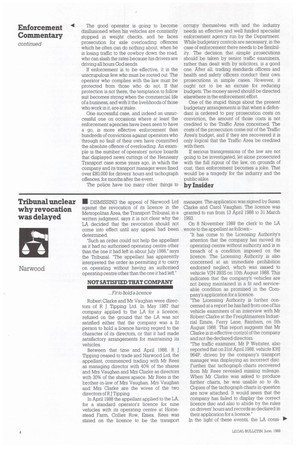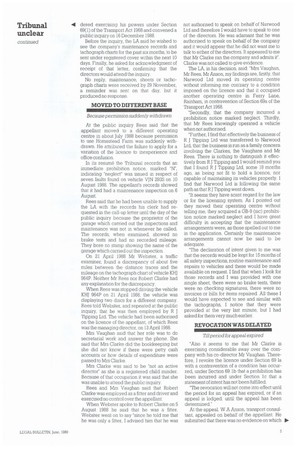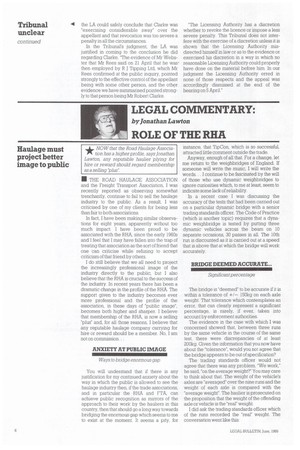Tribunal unclear why revocation was delayed
Page 102

Page 103

Page 104

If you've noticed an error in this article please click here to report it so we can fix it.
• DISMISSING the appeal of Narwood Ltd against the revocation of its licence in the Metropolitan Area, the Transport Tribunal, in a written judgment, says it is not clear why the LA decided that the revocation should not come into effect until any appeal had been determined "Such an order could not help the appellant as it had no authorised operating centre other than the one it had left in about July 1988," says the Tribunal. "The appellant has apparently interpreted the order as permitting it to carry on operating without having an authorised operating centre other than the one it had left."
NOT SATISFIED THAT COMPANY ...Fit to hold a licence Robert Clarke and Mr Vaughan were directors of R J Tipping Ltd. In May 1987 that company applied to the LA for a licence, refused on the ground that the LA was not satisfied either that the company was a fit person to hold a licence having regard to the character of its directors, or that it had made satisfactory arrangements for maintaining its vehicles.
Between that time and April 1988, R J Tipping ceased to trade and Narwood Ltd, the appellant, commenced trading with Mr Rees as managing director with 40% of the shares and Mrs Vaughan and Mrs Clarke as directors with 30% of the shares apiece. Mr Rees is the brother-in-law of Mrs Vaughan. Mrs Vaughan and Mrs Clarke are the wives of the two directors of R J Tipping.
In April 1988 the appellant applied to the LA, for a standard operator's licence for nine vehicles with its operating centre at Homestead Farm, Collier Row, Essex. Rees was stated on the licence to be the transport manager. The application was signed by Susan Clarke and Carol Vaughan. The licence was granted to run from 13 April 1988 to 31 March 1993.
On 8 November 1988 the clerk to the LA wrote to the appellant as follows: "It has come to the Licensing Authority's attention that the company has moved its operating centre without authority and is in breach of a condition imposed on the licence. The Licensing Authority is also concerned at an immediate prohibition endorsed neglect, which was issued to vehicle VJN 293S on 10th August 1988. This indicates that the company's vehicles are not being maintained in a fit and serviceable condition as promised in the Company's application for a licence.
"The Licensing Authority is further concerned at a report he has had from one of his vehicle examiners of an interview with Mr Robert Clarke at the Freightmasters Industrial Estate, Ferry Lane, Rainham, on 5th August 1988. This report suggests that Mr Clarke is in effective control of the company and not the declared directors.
'The traffic examiner, Mr P Webster, also reported that on 21st April 1988, vehicle KHJ 964P, driven by the company's transport manager was displaying an incorrect disc. Further that tachograph charts recovered from Mr Rees revealed missing mileage. When Mr Clarke was asked to produce further charts, he was unable so to do. Copies of the tachograph charts in question are now attached It would seem that the company has failed to display the correct licence disc and also to abide by the rules on drivers' hours and records as declared in their application for a licence."
In the light of these events, the LA consi dered exercising his powers under Section 69(1) of the Transport Act 1968 and convened a public inquiry on 16 December 1988.
Before the inquiry, the LA said he wished to see the company's maintenance records and tachograph charts for the past six months, lobe sent under registered cover within the next 10 days. Finally, he asked for acknowledgment of receipt of that letter, confirming that the directors would attend the inquiry.
No reply, maintenance, sheets or tachograph charts were received by 29 November, a reminder was sent on that day, but it produced no response.
MOVED TO DIFFERENT BASE Because permission suddenly withdrawn At the public inquiry Rees said that the appellant moved to a different operating centre in about July 1988 because permission to use Homestead Farm was suddenly withdrawn. He attributed the failure to apply for a variation of the licence to inexperience and office confusion.
In its resume the Tribunal records that an immediate prohibition notice, marked IT, indicating "neglect" was issued in respect of seven faults found on vehicle YIN 293S on 10 August 1988. The appellant's records showed that it had had a maintenance inspection on 6 August.
Rees said that he had been unable to supply the LA with the records his clerk had requested in the call-up letter until the day of the public inquiry because the proprietor of the garage which carried out the inspections and maintenance was not in whenever he called. The records, when examined, showed no brake tests and had no recorded mileage. They bore no stamp showing the name of the garage which carried out the inspection.
On 21 April 1988 Mr Webster, a traffic examiner, found a discrepancy of about five miles between the distance traces and the mileage on the tachograph chart of vehicle KHJ 964P. Neither Mr Rees nor Robert Clarke had any explanation for the discrepancy.
When Rees was stopped driving the vehicle KI-11 964P on 21 April 1988, the vehicle was displaying two discs for a different company. Rees told Webster, and repeated at the public inquiry, that he was then employed by R J Tipping Ltd. The vehicle had been authorised on the licence of the appellant, of which Rees was the managing director, on 13 April 1988.
Mrs Vaughan said that her role was to do secretarial work and answer the phone. She said that Mrs Clarke did the bookkeeping but she did not know if there were petty cash accounts or how details of expenditure were passed to Mrs Clarke.
Mrs Clarke was said to be "not an active director as she is a registered child minder. Because of that occupation it was said that she was unable to attend the public inquiry.
Rees and Mrs Vaughan said that Robert Clarke was employed as a fitter and driver and exercised no control over the appellant.
When Webster spoke to Robert Clarke on 5 August 1988 he said that he was a fitter. Webster went on to say "since he told me that he was only a fitter, I advised him that he was not authorised to speak on behalf of Narwood Ltd and therefore I would have to speak to one of the directors. He was adamant that he was authorised to speak on behalf of the company and it would appear that he did not want me to talk to either of the directors. It appeared to me that Mr Clarke ran the company and admits if'. Clarke was not called to give evidence.
The LA, in his decision, said: "Mrs Vaughan, Mr Rees, Mr Anson, my findings are, firstly, that Narwood Ltd moved its operating centre without informing me contrary to a condition imposed on the licence and that it occupied another operating centre in Ferry Lane, Ramham, in contravention of Section 69a of the Transport Act 1968.
"Secondly, that the company incurred a prohibition notice marked neglect. Thirdly, that Mr Rees knowingly operated a vehicle when not authorised.
"Further, I find that effectively the business of R J Tipping Ltd was transferred to Narwood Ltd, that the business is run as a family concern involving the Clarkes, the Vaughans and Mr Rees. There is nothing to distinguish it effec tively from R J Tipping and I would remind you that I found R J Tipping Ltd, some 18 months ago, as being not fit to hold a licence, nor capable of maintaining its vehicles properly. I find that Narwood Ltd is following the same path as that RI Tipping went down.
It seems they have scant regard for the law or for the licensing system. As I pointed out they moved their operating centre without telling me, they acquired a GB-9 (sic) prohibition notice marked neglect and I have great difficulty in accepting that the maintenance arrangements were, as those spelled out to me in the application. Certainly the maintenance arrangements cannot now be said to be adequate.
"The declaration of intent given to me was that the records would be kept for 15 months of all safety inspections, routine maintenance and repairs to vehicles and these would be made available on request. I find that when I look for those records and I was provided with one single sheet, there were no brake tests, there were no checking signatures, there were no invoices or bills for items repaired. All these I would have expected to see and similar with the tachographs, I notice that they were provided at the very last minute, but I had asked for them very much earlier.
REVOCATION WAS DELAYED Till period for appeal expired "Also it seems to me that Mr Clarke is exercising considerable sway over the company with his co-director Mr Vaughan Therefore, I revoke the licence under Section 69 la with a contravention of a condition has occurred, under Section 69 lb that a prohibition has been incurred and under Section lc that a statement of intent has not been fulfilled.
"The revocation will not come into effect until the period for an appeal has expired, or if an appeal is lodged, until the appeal has been determined."
At the appeal, W A Anson, transport consultant, appealed on behalf of the appellant. He submitted that there was no evidence on which the LA could safely conclude that Clarke was 'exercising considerable sway' over the appellant and that revocation was too severe a penalty in all the circumstances, In the Tribunal's judgment, the LA was justified in coming to the conclusion he did regarding Clarke. "The evidence of Mr Webster that Mr Rees said on 21 April that he was• then employed by R J Tipping Ltd, which Mr Rees confirmed at the public inquiry, pointed strongly to the effective control of the appellant being with some other person, and the other evidence we have summarised pointed strongly to that person being Mr Robert Clarke. "The Licensing Authority has a discretion whether to revoke the licence or impose a less severe penalty. This Tribunal does not interfere with the exercise of a discretion unless it is shown that the Licensing Authority misdirected himself in law or as to the evidence or exercised his discretion in a way in which no reasonable Licensing Authority could properly have done on the material before him. In our judgment the Licensing Authority erred in none of those respects and the appeal was accordingly dismissed at the end of the hearing on 5 April."












































































































































